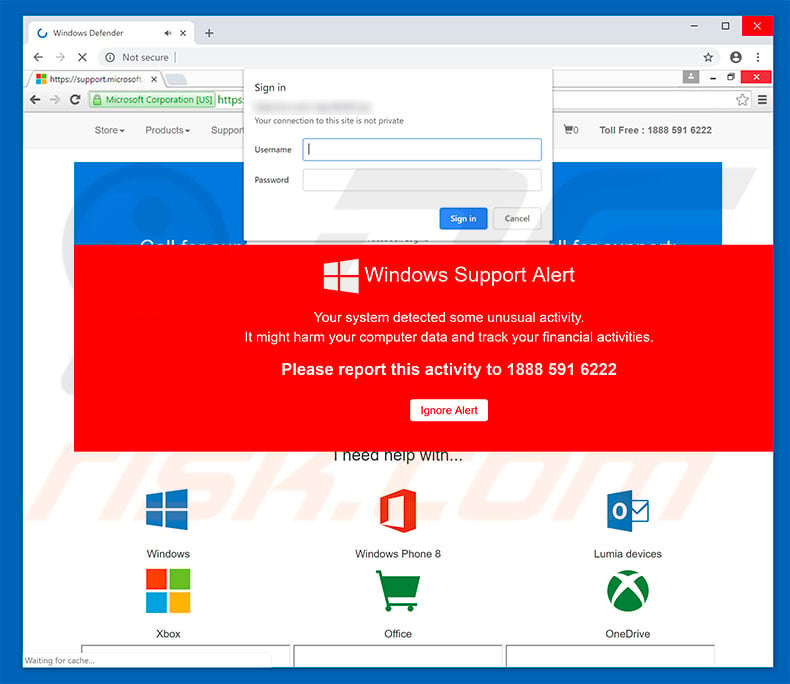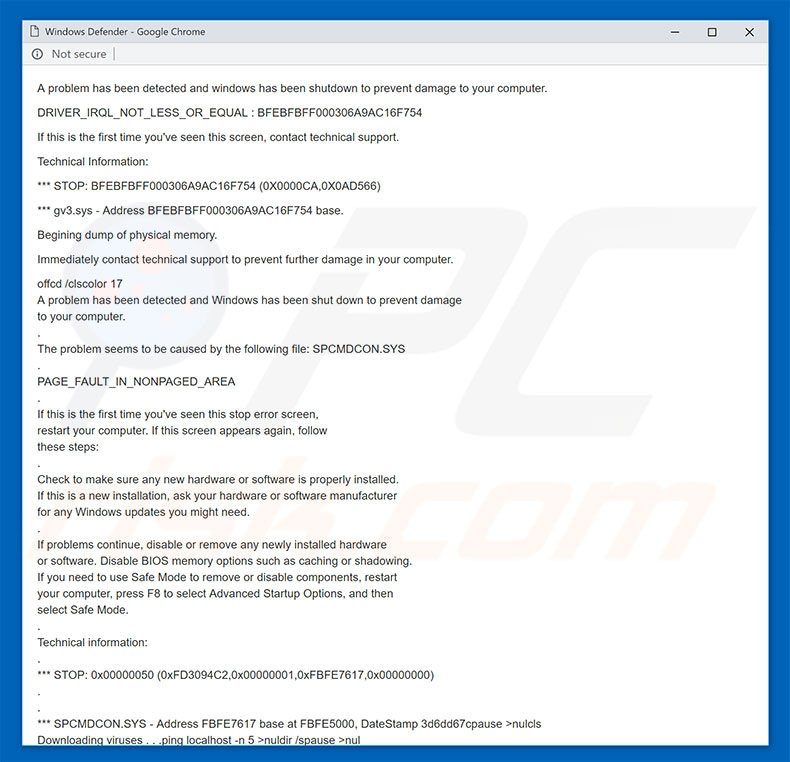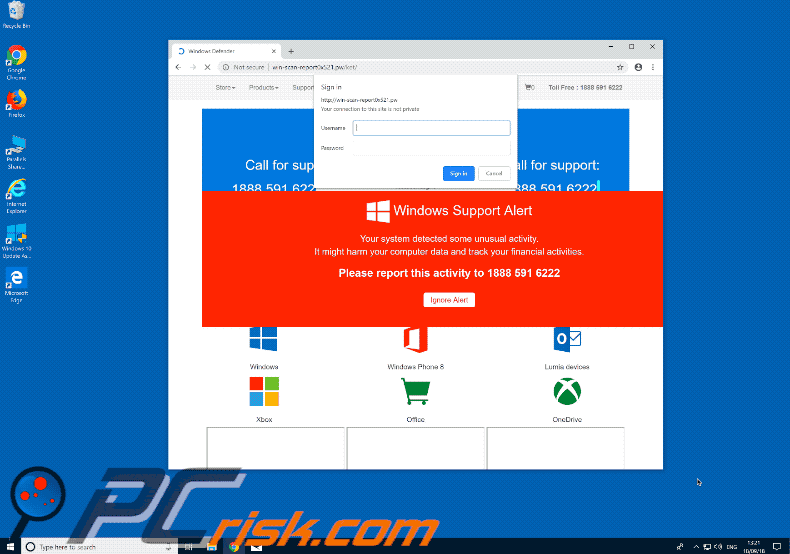Please Report This Activity POP-UP Scam
Phishing/ScamAlso Known As: "Please report this activity" virus
Get free scan and check if your device is infected.
Remove it nowTo use full-featured product, you have to purchase a license for Combo Cleaner. Seven days free trial available. Combo Cleaner is owned and operated by RCS LT, the parent company of PCRisk.com.
What is Please Report This Activity?
Similar to "Virus Is Sending Your Information To Hackers", "Your System Data Has Been Compromized", and many others, "Please Report This Activity" is a fake error message delivered by various deceptive websites.
Visitors generally arrive at these sites inadvertently - they are redirected by potentially unwanted applications (PUAs) or intrusive ads delivered by other rogue sites. Be aware that potentially unwanted applications usually infiltrate systems without users’ permission. As well as causing redirects, they deliver intrusive advertisements and gather sensitive information.

"Please Report This Activity" essentially states that suspicious activity (that poses a direct threat to users' privacy) has been detected and encourages users to immediately report it using the telephone number provided ("1888 591 6222"). After calling the number, they will also be provided with instructions on how to resolve the issue.
In fact, "Please Report This Activity" is fake and Microsoft (Windows Operating System developers) have nothing to do with it. Although the message contains a Windows OS logo, this is a scam - criminals generate revenue by scaring and tricking unsuspecting users into paying for services that are not required.
Therefore, ignore "Please Report This Activity" and never call the aforementioned telephone number. To remove this error, simply close the browser, however, some rogue sites are known to use scripts that prevent users from closing browsing tabs/windows.
In these cases, terminate the browser using Task Manager or simply reboot the computer. Once the browser is restarted, do not restore the previous session, otherwise the rogue sites are reopened.
Potentially unwanted applications are likely to deliver pop-up, banner, coupon, and other similar advertisements. To achieve this, developers use tools that enable placement of third party graphical content on any site. Therefore, delivered ads often conceal underlying content, thereby significantly diminishing the browsing experience.
In addition, some redirect to infectious websites and execute scripts that download/install malware. Therefore, even a single accidental click might result in high-risk computer infections. Potentially unwanted applications are also notorious for information tracking.
These apps record IP addresses, website URLs visited, pages viewed, search queries, and other similar data relating to browsing activity.
Once recorded, information is shared with third parties (potentially, cyber criminals). The data often includes personal information that can be misused to generate revenue. The presence of these data-tracking applications can lead to serious privacy issues or even identity theft. You are strongly advised to eliminate them immediately.
| Name | "Please report this activity" virus |
| Threat Type | Phishing, Scam, Social Engineering, Fraud |
| Symptoms | Unauthorized online purchases, changed online account passwords, identity theft, illegal access of one's computer. |
| Distribution methods | Deceptive emails, rogue online pop-up ads, search engine poisoning techniques, misspelled domains. |
| Damage | Loss of sensitive private information, monetary loss, identity theft. |
| Malware Removal (Windows) |
To eliminate possible malware infections, scan your computer with legitimate antivirus software. Our security researchers recommend using Combo Cleaner. Download Combo CleanerTo use full-featured product, you have to purchase a license for Combo Cleaner. 7 days free trial available. Combo Cleaner is owned and operated by RCS LT, the parent company of PCRisk.com. |
"Please Report This Activity" shares many similarities with dozens of other fake errors. All claim that the system is infected, missing files, or damaged in other similar ways, however, errors such as "Please Report This Activity" are designed only to trick unsuspecting users into purchasing useless software (e.g., fake anti-virus suites) or paying for unnecessary services (such as fake 'tech support').
Rogue apps also share many similarities. By offering "useful features", they attempt to give the impression of legitimacy. PUAs are designed only to generate revenue for the developers. Rather than enabling any useful features, they pose a direct threat to your privacy and browsing safety.
How did potentially unwanted applications install on my computer?
Some unwanted applications have official download websites, however, due to the lack of knowledge and careless behavior of many users, these apps often infiltrate systems without permission, since developers proliferate them using intrusive advertisements and a deceptive marketing method called "bundling" (stealth installation of third party apps with regular software).
Developers are not honest enough to disclose PUA installations properly. They are hidden within "Custom/Advanced" options (or other sections) of the download/installation processes. Furthermore, many users rush download/installation processes and skip steps.
In addition, they click advertisements without understanding the possible consequences. This behavior often leads to inadvertent installation of potentially unwanted applications.
How to avoid installation of potentially unwanted applications?
To prevent system infiltration by PUAs, be very cautious when browsing the Internet and downloading/installing software. Remember that intrusive ads usually seem legitimate, since developers invest many resources into intrusive ad design, however, they can redirect to pornography, adult dating, gambling, surveys, and other dubious websites.
If you encounter these ads, immediately remove all dubious applications and browser plug-ins. It is also very important to carefully analyze each download/installation step using "Custom" or "Advanced" settings. Opt-out of additionally-included programs and decline offers to download/install them.
Software should be downloaded from official sources only, using direct download links - third party downloaders/installers should never be used. If your computer is already infected with PUAs, we recommend running a scan with Combo Cleaner Antivirus for Windows to automatically eliminate them.
Text presented in "Please Report This Activity" pop-up:
Windows Support Alert
Your system detected some unusual activity.
It might harm your computer data and track your financial activities.
Please report this activity to 1888 591 6222
Ignore Alert
Screenshot of second "Please Report This Activity" pop-up:

Text presented within this pop-up:
A problem has been detected and windows has been shutdown to prevent damage to your computer.
DRIVER_IRQL_NOT_LESS_OR_EQUAL : BFEBFBFF000306A9AC16F754
If this is the first time you've seen this screen, contact technical support.
Technical Information:
*** STOP: BFEBFBFF000306A9AC16F754 (0X0000CA,0X0AD566)
*** gv3.sys - Address BFEBFBFF000306A9AC16F754 base.
Begining dump of physical memory.
Immediately contact technical support to prevent further damage in your computer.
offcd /clscolor 17
A problem has been detected and Windows has been shut down to prevent damage
to your computer.
.
The problem seems to be caused by the following file: SPCMDCON.SYS
.
PAGE_FAULT_IN_NONPAGED_AREA
.
If this is the first time you've seen this stop error screen,
restart your computer. If this screen appears again, follow
these steps:
.
Check to make sure any new hardware or software is properly installed.
If this is a new installation, ask your hardware or software manufacturer
for any Windows updates you might need.
.
If problems continue, disable or remove any newly installed hardware
or software. Disable BIOS memory options such as caching or shadowing.
If you need to use Safe Mode to remove or disable components, restart
your computer, press F8 to select Advanced Startup Options, and then
select Safe Mode.
.
Technical information:
.
*** STOP: 0x00000050 (0xFD3094C2,0x00000001,0xFBFE7617,0x00000000)
.
.
*** SPCMDCON.SYS - Address FBFE7617 base at FBFE5000, DateStamp 3d6dd67cpause >nulcls
Downloading viruses . . .ping localhost -n 5 >nuldir /spause >nul
offcd /clscolor 17
A problem has been detected and Windows has been shut down to prevent damage
to your computer.
.
The problem seems to be caused by the following file: SPCMDCON.SYS
.
PAGE_FAULT_IN_NONPAGED_AREA
.
If this is the first time you've seen this stop error screen,
restart your computer. If this screen appears again, follow
these steps:
.
Check to make sure any new hardware or software is properly installed.
If this is a new installation, ask your hardware or software manufacturer
for any Windows updates you might need.
.
If problems continue, disable or remove any newly installed hardware
or software. Disable BIOS memory options such as caching or shadowing.
If you need to use Safe Mode to remove or disable components, restart
your computer, press F8 to select Advanced Startup Options, and then
select Safe Mode.
.
Technical information:
.
*** STOP: 0x00000050 (0xFD3094C2,0x00000001,0xFBFE7617,0x00000000)
.
.
*** SPCMDCON.SYS - Address FBFE7617 base at FBFE5000, DateStamp 3d6dd67cpause >nulcls
Downloading viruses . . .ping localhost -n 5 >nuldir /spause >nul
Call Support:
1888 591 6222
The appearance of "Please Report This Activity" pop-up (GIF):

Instant automatic malware removal:
Manual threat removal might be a lengthy and complicated process that requires advanced IT skills. Combo Cleaner is a professional automatic malware removal tool that is recommended to get rid of malware. Download it by clicking the button below:
DOWNLOAD Combo CleanerBy downloading any software listed on this website you agree to our Privacy Policy and Terms of Use. To use full-featured product, you have to purchase a license for Combo Cleaner. 7 days free trial available. Combo Cleaner is owned and operated by RCS LT, the parent company of PCRisk.com.
Quick menu:
- What is "Please report this activity" virus?
- How to identify a pop-up scam?
- How do pop-up scams work?
- How to remove fake pop-ups?
- How to prevent fake pop-ups?
- What to do if you fell for a pop-up scam?
How to identify a pop-up scam?
Pop-up windows with various fake messages are a common type of lures cybercriminals use. They collect sensitive personal data, trick Internet users into calling fake tech support numbers, subscribe to useless online services, invest in shady cryptocurrency schemes, etc.
While in the majority of cases these pop-ups don't infect users' devices with malware, they can cause direct monetary loss or could result in identity theft.
Cybercriminals strive to create their rogue pop-up windows to look trustworthy, however, scams typically have the following characteristics:
- Spelling mistakes and non-professional images - Closely inspect the information displayed in a pop-up. Spelling mistakes and unprofessional images could be a sign of a scam.
- Sense of urgency - Countdown timer with a couple of minutes on it, asking you to enter your personal information or subscribe to some online service.
- Statements that you won something - If you haven't participated in a lottery, online competition, etc., and you see a pop-up window stating that you won.
- Computer or mobile device scan - A pop-up window that scans your device and informs of detected issues - is undoubtedly a scam; webpages cannot perform such actions.
- Exclusivity - Pop-up windows stating that only you are given secret access to a financial scheme that can quickly make you rich.
Example of a pop-up scam:

How do pop-up scams work?
Cybercriminals and deceptive marketers usually use various advertising networks, search engine poisoning techniques, and shady websites to generate traffic to their pop-ups. Users land on their online lures after clicking on fake download buttons, using a torrent website, or simply clicking on an Internet search engine result.
Based on users' location and device information, they are presented with a scam pop-up. Lures presented in such pop-ups range from get-rich-quick schemes to fake virus scans.
How to remove fake pop-ups?
In most cases, pop-up scams do not infect users' devices with malware. If you encountered a scam pop-up, simply closing it should be enough. In some cases scam, pop-ups may be hard to close; in such cases - close your Internet browser and restart it.
In extremely rare cases, you might need to reset your Internet browser. For this, use our instructions explaining how to reset Internet browser settings.
How to prevent fake pop-ups?
To prevent seeing pop-up scams, you should visit only reputable websites. Torrent, Crack, free online movie streaming, YouTube video download, and other websites of similar reputation commonly redirect Internet users to pop-up scams.
To minimize the risk of encountering pop-up scams, you should keep your Internet browsers up-to-date and use reputable anti-malware application. For this purpose, we recommend Combo Cleaner Antivirus for Windows.
What to do if you fell for a pop-up scam?
This depends on the type of scam that you fell for. Most commonly, pop-up scams try to trick users into sending money, giving away personal information, or giving access to one's device.
- If you sent money to scammers: You should contact your financial institution and explain that you were scammed. If informed promptly, there's a chance to get your money back.
- If you gave away your personal information: You should change your passwords and enable two-factor authentication in all online services that you use. Visit Federal Trade Commission to report identity theft and get personalized recovery steps.
- If you let scammers connect to your device: You should scan your computer with reputable anti-malware (we recommend Combo Cleaner Antivirus for Windows) - cyber criminals could have planted trojans, keyloggers, and other malware, don't use your computer until removing possible threats.
- Help other Internet users: report Internet scams to Federal Trade Commission.
Share:

Tomas Meskauskas
Expert security researcher, professional malware analyst
I am passionate about computer security and technology. I have an experience of over 10 years working in various companies related to computer technical issue solving and Internet security. I have been working as an author and editor for pcrisk.com since 2010. Follow me on Twitter and LinkedIn to stay informed about the latest online security threats.
PCrisk security portal is brought by a company RCS LT.
Joined forces of security researchers help educate computer users about the latest online security threats. More information about the company RCS LT.
Our malware removal guides are free. However, if you want to support us you can send us a donation.
DonatePCrisk security portal is brought by a company RCS LT.
Joined forces of security researchers help educate computer users about the latest online security threats. More information about the company RCS LT.
Our malware removal guides are free. However, if you want to support us you can send us a donation.
Donate
▼ Show Discussion